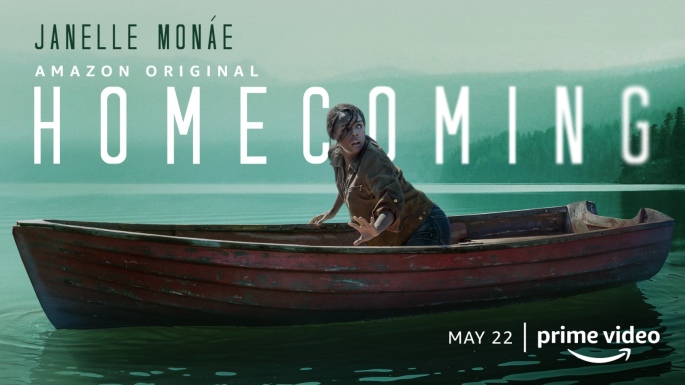
I did not expect the creators of Amazon Prime’s Homecoming to craft something as compelling for their second season as they did the first time around but here we are. Season one is a brilliant, tense, meticulously mounted piece of suspense drama storytelling and is one of those perfectly bookended items that never even needed a continuation, which is why I am so surprised at how much I loved this second iteration, which is just close enough to the heels of its predecessor to be considered a new chapter of the same story and just independent enough to be kind of anthology as well.
From this point forward it gets a bit spoiler heavy for season one, so there that is. As we open a young woman (Janelle Monáe) awakens in a canoe on the middle of a lake with complete amnesia, her mind wiped clean. This keeps up the paranoid Bourne and Hitchcock stylistics that have been a staple since season one. When we left this story it was becoming clear that the shadowy Geist corporation is doing some shady pharmaceutical research on unknowing veterans with PTSD, and as we enter into this new chapter we see that this is even unbeknownst to their own CEO, a salt of the earth entrepreneur played by the great Chris Cooper, who I haven’t seen in a while. Monaé’s character along with others must get to the bottom of what Geist is up to while dealing with season one’s disgruntled vet Walter Cruz (Stephan James, an extraordinary talent), crafty Geist fixer Audrey Temple (Hong Chau, always excellent) and a spectacularly corrupt Department of Defence bitch played by Joan Cusack in a towering pillar of ham fisted lunacy.
This season is quite the departure from the first, mainly for the fact that Julia Roberts’ Heidi Bergman is no longer around, she was the rock, moral centre and sympathy bank for that chapter and the others who absorb that position here are considerably less innocuous. That provides lots of terrain for moral ambiguities, complexities and psychological rifts especially with Monáe’s character who is played wonderfully. Chris Cooper was the highlight of this one for me though, as the aging founder of Geist, a profane horticultural guru who feels ill matched to the tide of corrupt bureaucracy and mutinied against by his own employees. He lives in a rusticated farmhouse on the edge of vast crops of mysterious foliage while the Geist headquarters loom clandestine on the horizon, built of hard metals, stark angles and gloom. He’s an earthy element amongst all this new age Pharma innovation and I loved his cranky, compassionate performance, an obstinate old salt who watches Airwolf on a tiny analog tv to get him ‘fired up’ and rebels haughtily at the malevolent forced trying to privateer his inventions. One way this differs from the first season is in use of music, there are no more direct lifts from classic film scores but rather beautiful new compositions from Emile Mosseri. The themes are all still intact though, probing the same moral ground and complicated character profiles using terrific camera work and burnished colour timing to bring this story to life, a scintillating tale that takes a while to get to the heart of, kind of like the frequent images of spiralled architecture we see that serves as visual cue for what this story wants to explore in structure and content. A bit shorter and less dense than season one but no less mesmerizing, well written, flawlessly acted and beautifully produced.
-Nate Hill








